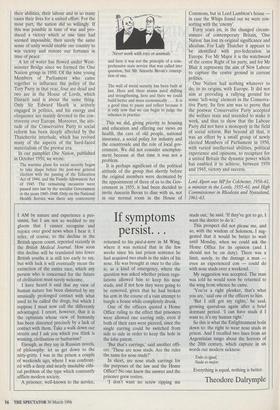If symptoms
persist. . .
I AM by nature and experience a pes- simist, but I am not so wedded to my gloom that I cannot recognise and rejoice over good news when I hear it. I refer, of course, to the decline in the British sperm count, reported recently in the British Medical Journal. How soon this decline will be translated into fewer British youths it is still too early to say, but with luck it will eventually mean the extinction of the entire race, which any person who is concerned for the future of civilisation must surely welcome.
I have heard it said that my view of human nature has been distorted by my unusually prolonged contact with what used to be called the dregs, but which I suppose I must now call the differently advantaged. I retort, however, that it is the optimists whose view of humanity has been distorted precisely by a lack of contact with them. Take a walk down our streets and I ask you which you think is winning, civilisation or barbarism?
Enough, as they say in Russian novels, of philosophy: let us get down to the nitty-gritty. I was in the prison a couple of weekends ago, where I was confront- ed with a deep and nearly insoluble ethi- cal problem of the type which constantly afflicts modern society.
A prisoner, well-known to the service, returned to his pied-a-terre in M Wing, where it was noticed that in the few weeks since his last prison sentence he had acquired two studs in the sides of his nose. He was brought at once to the clin- ic, as a kind of emergency, where the question was asked whether prison regu- lations allowed him to keep his nose studs, and if not how they Were going to be removed, given that he had broken his arm in the course of a vain attempt to burgle a house while completely drunk.
One of the officers quoted a Home Office ruling to the effect that prisoners were allowed one earring only, even if both of their ears were pierced, since the single earring could be switched from side to side in order to keep the hole in the lobe patent.
`But that's earrings,' said another offi- cer. `These are nose studs. Are the rules the same for nose studs?'
In short, are nose studs earrings for the purposes of the law and the Home Office? No one knew the answer and the prisoner grew restive.
'I don't want no screw ripping me studs out,' he said. 'If they've got to go, I want the doctor to do it.'
This prospect did not please me, and so, with the wisdom of Solomon, I sug- gested that it would be better to wait until Monday, when we could ask the Home Office for its opinion (and I should not be on duty). There was a limit, surely, to the damage a man — even an experienced con — could do with nose studs over a weekend.
My suggestion was accepted. The man was told he would soon be returned to the wing from whence he came.
'You're a right plonker, that's what you are,' said one of the officers to him.
'But I still got my rights,' he said, growing querulous again after a brief dormant period. 'I can have studs if I want to, it's my human right.'
So this is what the Enlightenment boils down to: the right to wear nose studs in prison. And I recalled two lines from an Argentinian tango about the horrors of the 20th century, which capture in six words our modern sickness: Todo es igual, Nada es mejor.
Everything is equal, nothing is better.
Theodore Dalrymple


























































 Previous page
Previous page